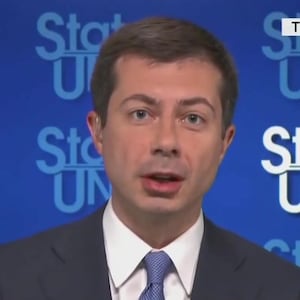Senate Budget Committee Chairman Bernie Sanders (I-VT) offered up some mild praise for the bipartisan infrastructure bill proposed by a group of 20 senators, saying that it’s “mostly good” but that he’s still concerned that it will be paid for via electric vehicle fees and increased gas taxes, which he doesn’t support.
Amid a stalemate in negotiations between the White House and Senate Republicans, a bipartisan group of lawmakers announced last week that they had reached an infrastructure deal that would include $579 billion in new spending. While still just a fraction of President Joe Biden’s most recent $1.7 trillion proposal—down from an initial $2.3 trillion—this latest agreement has sparked some optimism due to 11 GOP senators signing on to the deal.
At the same time, it is still up in the air whether the bill can garner enough Democratic support, specifically due to apprehension from progressives over the funding of the legislation and that it excludes climate-based issues.
ADVERTISEMENT
Appearing on NBC News’ Meet the Press on Sunday, Sanders was pressed by anchor Chuck Todd on what it would take for him to support the deal and if he’d come around to it if Biden gave his blessing.
“What we have got to do in these budgets is address the crises facing the American people,” the progressive senator said. “It is true that our roads and our bridges and our water systems and our wastewater plants are crumbling and we need to invest in them.”
Contending that the new bill only provides about 25 percent of the money that Biden initially called for, Sanders went on to say that the Senate still needs to address the needs of the working class, such as affordable childcare and housing. Additionally, he said it was imperative to tackle the “terrible climate crisis that we face and transform our energy system.”
Todd, meanwhile, noted that Democrats appear to be looking at a process that would see them voting for this bill in order to convince centrist lawmakers such as Sen. Joe Manchin (D-WV) to support a larger spending plan.
“Are you comfortable with a two-step process, where you do—you noted, this is the 25 percent about of what, of what President Biden asked for. Is it worth it in your mind to take what you can get in a bipartisan way, especially if that’s the way you can get Joe Manchin and Kyrsten Sinema to get on board a Democrats-only bill that may tackle the care economy as you just outlined?” the Meet the Press host wondered aloud.
“Well, look, as I said, what is in the bipartisan bill in terms of spending is, from what I can see, mostly good,” the Vermont lawmaker replied. “It is roads and bridges, and we need to do that. That is what we are proposing in our legislation, but in much greater numbers.”
He added: “One of the concerns that I do have about the bipartisan bill is how they are going to pay for their proposals, and they’re not clear yet. I don’t know that they even know yet, but some of the speculation is raising a gas tax, which I don’t support, a fee on electric vehicles, privatization of infrastructure, those are proposals that I would not support.”
Circling back because he felt Sanders “kind of ducked the question,” Todd asked the influential senator if he would “support or at least vow not to kill the bipartisan deal” if he got a commitment from Biden and moderate senators that they’d support another larger bill through reconciliation.
“Well Chuck, I don’t know that anybody can give you an honest answer to that because nobody really knows what is going to be in this bipartisan agreement, and how it is going to be paid for,” Sanders responded. “So if it is roads and bridges, yeah, of course we need to do that and I support that. If it is regressive taxation—you know, raising the gas tax or a fee on electric vehicles, or the privatization of infrastructure, no I wouldn’t support it, but we don’t have the details right now.”






